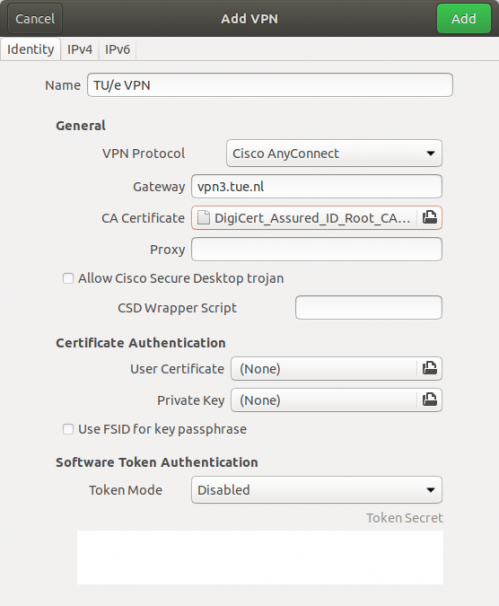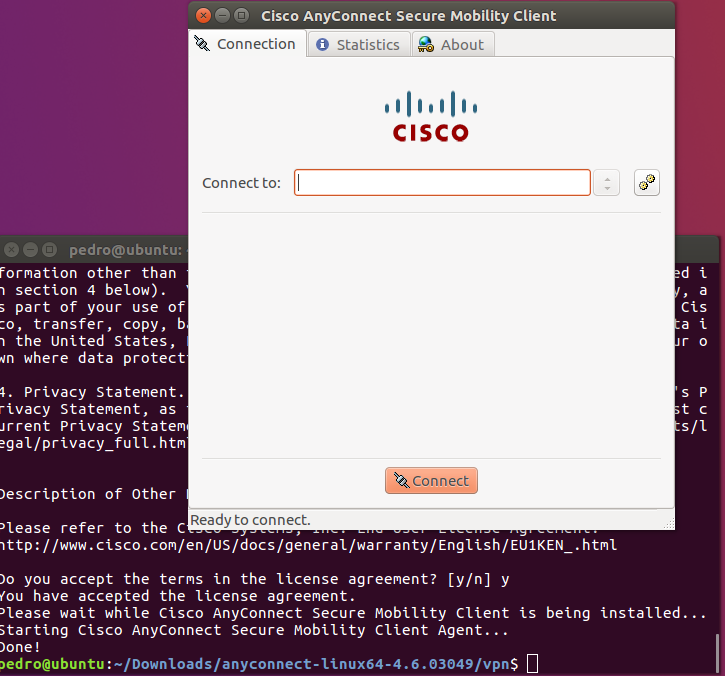Cisco AnyConnect Secure Mobility is a collection of features across multiple Cisco products that extends control and security into borderless networks. The products that work together to provide AnyConnect Secure Mo bility are the Web Security appliance, adaptive security appliance, and Cisco AnyConnect. Nov 22, 2017 Solved: Hi all, I'm not able to install Cisco Anyconnect client v4.4.01054 on Arch Linux. It is trying to install an init/rc.d script on a systemd environemnt. Download timewave driver. $ sudo bash anyconnect-linux64-4.4.01054-core-vpn-webdeploy-k9.sh Installing Cisco. In this architecture, remote users use Cisco AnyConnect 3.0 or Cisco IPsec VPN Client to establish an IPsec tunnel with the appliance. Just like with the tunneling remote access SSL VPN, after bidirectional authentication, the appliance applies a set of authorization and accounting rules to the user session.

Package Details: anyconnect-client 4.5.04029-3
Package Actions
- View PKGBUILD / View Changes
| Git Clone URL: | https://aur.archlinux.org/anyconnect-client.git (read-only, click to copy) |
|---|---|
| Package Base: | anyconnect-client |
| Description: | Cisco AnyConnect Secure Mobility Client |
| Upstream URL: | https://www.cisco.com/c/en_au/products/security/anyconnect-secure-mobility-client/index.html |
| Licenses: | custom |
| Submitter: | RunasSudo |
| Maintainer: | None |
| Last Packager: | RunasSudo |
| Votes: | 3 |
| Popularity: | 0.164280 |
| First Submitted: | 2019-02-09 07:20 |
| Last Updated: | 2019-04-02 23:55 |
Required by (0)
RunasSudo commented on 2019-02-09 07:22
To build, download anyconnect-linux64-$pkgver-core-vpn-webdeploy-k9.sh and place it with the sources, and adjust the PKGBUILD pkgver as appropriate.
matzomat commented on 2021-02-10 18:23
I was able to update the PKGBUILD for pkgver=4.9.04053, fixing @japhir 's errors among others:
${INSTALL} -Dicons instead ofcpvpndownloader.shis missing in 4.9.04053 so I commented outsedon iticon-theme.cacheexists, sormit from the package (re-created anyway when updating the icon cache)- fix
manifesttoolsymlink to not point into$pkgdir(?) after package install
This worked for me:
japhir commented on 2020-11-26 14:38
I just tried updating to pkgver=4.9.04043 but it seems to crash. I've downloaded the new anyconnect-linux64-4.9.04043-core-vpn-webdeploy-k9.sh file through my university website, changed the pkgver in the PKGBUILD in ~/.cache/paru/clone/anyconnect-client and tried to run makepkg -si, resulting in the following output:
EDIT: for now I've quickly just run the script as the user manual says, but that means that it's installed some files in /opt that pacman doesn't know about :(. I'll have to sort out that mess in the future.
thomasb commented on 2020-04-02 16:08
FYI: it also worked to build the package with the anyconnect-linux64-$pkgver-core-vpn-webdeploy-k9.sh file found on the Internet, and then run the scriptWithAMoreRecentVersion.sh file provided by the admin.
ElderBladeX commented on 2020-01-22 06:18
I installed the packaged according to @trOlley without issue - thanks for that clarification. The app crashed immediately on startup for me. I had to install gtk2 to resolve the crash at startup and webkit2gtk to successfully connect. Don't forget to start/enable vpnagentd.service.
Alad commented on 2019-12-01 13:15
I only have 'predeploy' versions from my employer. (anyconnect-linux64-4.7.04056-predeploy-k9.tar.gz) What's the difference to 'webdeploy', and can I still use this package with it?
tr0lley commented on 2019-04-30 16:40
@dfjigdfijgojio What wasn't clear to me at the beginning was where to put the anyconnect-..-webdeploy-k9.sh file, but I've worked it out! Here are the steps I took:
- As per @RunasSudo's instructions, you need to download
anyconnect-linux64-$pkgver-core-vpn-webdeploy-k9.sh. - Using your AUR client, clone the
anyconnect-clientpackage in a manner such that it prompts you to edit the PKGBUILD file. I used pacaur, so the command for me waspacaur -Sde anyconnect-client. - When the PKGBUILD is opened in a text editor, go to your file explorer and navigate to your .cache folder and find the folder of your package manager. There, you will find the source folder called
anyconnect-cisco. In my case, the directory was:/home/usr/.cache/pacaur/anyconnect-cisco. - Copy your downloaded
anyconnect-linux64-$pkgver-core-vpn-webdeploy-k9.shfile into this directory. Take notice that the$pkgverpart in your file's name will (probably) have something else in place. - In your PKGBUILD file, go the the line near the top beginning with
source:. Edit the declaration of theanyconnect-..-webdeploy-k9.shfile such that it matches the filename of the file you just copied into the source folder. - Write out the changes you made to the PKGBUILD and close the file. Your AUR manager will do the rest and (hopefully) install the anyconnect-client.
Trid input devices driver download. Hopefully this helps someone out there :)
basemax commented on 2019-04-02 23:36

Ragnarok commented on 2019-03-25 14:23
Where can I get the 'anyconnect-linux64-$pkgver-core-vpn-webdeploy-k9.sh' from? I can download from Cisco AnyConnect Secure Mobility Client a pkg and two differnt tars. None of them contains the webdeploy shell script that I need.
Arch Cisco Anyconnect Student
gpiantoni commented on 2019-03-21 15:27
Thanks for the awesome package! It saved me so much work.
BTW, I'd also suggest to add pangox-compat as dep.
nkay08 commented on 2019-03-18 15:43
Could you add a dependency to pangox-compat from extra ?/opt/cisco/anyconnect/bin/vpnui won't run without /usr/lib/libpangox-1.0.so
OpenConnect is a client for Cisco's AnyConnect SSL VPN and Pulse Secure's Pulse Connect Secure.
Installation
Install the openconnect package.
Usage
See openconnect(8). Simply run openconnect as root and enter your username and password when prompted:
More advanced invocation with username and password. Input the password after running the command.
Often VPN providers are offering different authentication groups for different access configurations like for example for a full tunnel or split tunnel connection. To show the different offered auth-groups and to get more information about the connection to the server in general use:
Sometimes, connecting to a Cisco VPN, the CSD (Cisco Secure Desktop) mechanism is required (see: https://www.infradead.org/openconnect/csd.html). In that case using the '--csd-wrapper' parameter can help, the wrappers are stored under '/usr/lib/openconnect/'.
Juniper Pulse Client
In order to connect to a Pulse Connect Secure server you need to know the SHA-1 of its certificate.
Split routing
Split routing can be achieved using vpn-slice-gitAUR in place of vpnc-script, so that you can selectively access hosts over the VPN but otherwise remain on your own LAN. Example:
Integration
NetworkManager
Install the networkmanager-openconnect package, then restartNetworkManager.service.
Configure and connect with nm-applet (NetworkManager's icon tray utility from network-manager-applet) or similar utility.
See NetworkManager for details.
netctl
A simple tuntapnetctl.profile(5) can be used to integrate OpenConnect in the normal Netctl workflow. For example:
Install Cisco Anyconnect Vpn
This allows execution like:
Note that this relies on LOCAL_USERNAME having a gpg-agent running, with the passphrase for the PGP key already cached.
If pass’ interactive query is wanted, use the following line for PASSWORD_CMD: Sis sound cards & media devices driver download for windows.
Adjust the DISPLAY variable as necessary.
